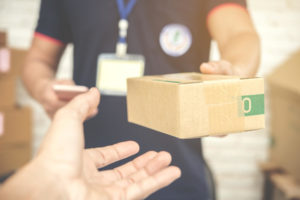
E-commerce has become a way of life for us. Ordering items online and having them magically arrive at our doorstep the next day is now the norm. We have become a culture that expects fast service, time saving and multitasking. Drive-through fast food, instant communications and one stop shopping are part of the American culture.
Delivery companies such as Amazon, Walmart, FedEx and UPS have at times struggled to keep up with this ever-growing demand. Because of this, these companies have taken delivery service to new levels. Amazon alone is reported to have delivered 2.3 billion packages last year, while expecting a 99% on time delivery success rate.
This expediency has a price. The reality is that to provide top notch service, drivers are pushed to extremes, causing serious injury accidents and even deaths. The Federal Motor Carrier Safety Administration has reported that between 2015 and 2017, FedEx drivers have been involved in a total of 1,762 crashes, with 575 injuries reported and 41 deaths. From 2012, the rate of accidents reported has escalated 254.5%.
Since 2015, there have been 60 delivery truck accidents and 10 deaths associated with Amazon delivery accidents.
In some cases, the companies that provide you with same-day or next-day delivery have escaped liability for the accidents and injuries that have occurred. In many instances, these companies claim that because their drivers act as independent contractors and not employees, they are not responsible. This position is debatable for many reasons.
Delivery Companies Often Remain Blameless
What is interesting here is that not only have these companies operated under a cloak of secrecy and kept a lid on how extensive their delivery networks really are, they have also tried to distance themselves from responsibility for the harms caused by their delivery network. In the relentless quest for more business and profits are they risking the safety of everyone on the road?
Smaller, Unmarked Vehicles
It is difficult to track the safety of delivery vehicles, for several reasons. Amazon for instance, often uses smaller delivery vehicles that are unmarked. Because of their smaller size, they are not monitored by the Department of Transportation, nor are they tracked by the Federal Motor Carrier Administration. Because of this, they have fallen into a regulatory void where they can avoid purchasing the large insurance policies required for the big rigs. Interestingly, it has been reported that they have purchased 20,000 more of these vehicles last year.
Some Drivers Use Their Own Vehicles
Many companies use apps to employ delivery drivers, such as Flex or Shipt. Through an app, a driver can sign up to work and use their own vehicle to make deliveries. While drivers are required to have a workable vehicle and carry insurance, no prior experience is necessary. They may not have a commercial license, and they go through minimal, if any, training. The vehicles may not be put through any type of safety protocol prior to beginning deliveries. And, the smaller vehicles may not carry the substantial insurance necessary to protect the public in the event of a wreck.
Third Party Delivery Companies
Large retailers also use small, independent delivery firms to keep up with demand. These small delivery companies are often loosely organized. One of the problems here is that because these delivery companies operate on such slim profit margin, safety may be compromised. There are many reports of poorly maintained vehicles and untenable conditions for employees. What is worse, when these third party delivery companies fail to provide adequate liability insurance, they may leave the victims of their negligence with very little opportunity to recover for their losses.
Accidents are beginning to become more common, and unsuspecting motorists are paying the price. When an accident occurs the company whose product is being delivered can claim that they employ independent contractors and therefore they are free from any liability. However, these companies often establish the delivery routes, track the deliveries, direct how and when deliveries will be made, and require drivers to meet the company’s delivery speed standards. This issue is only going to increase during the holidays, when deliveries will multiply exponentially.
At Morefield Speicher Bachman LC we believe that the driver is not the only responsible for the accident but in many cases, the company paying for the delivery of their product should also be held accountable. In cases where the delivery service is operating according to the requirements laid down by Amazon or the other product seller, the product seller may be responsible. We can investigate this issue for you.
If you or a loved one has been involved in a delivery truck accident, call our office for advice as soon as you possible. We are here to help you get the compensation you deserve. Call us today at 913-839-2808.
